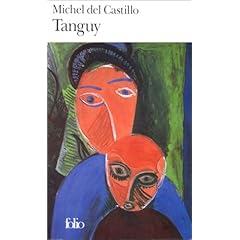
An autobiographical work by Michel del Castillo, a Spanish born writer who writes in French, Tanguy is a powerfully moving novel highly reminiscent of The Diary of Anne Frank (due mainly to the child's point of view as opposed to that of the adult). Narrating in first person, the story of a young Spanish boy, Tanguy, the novel is set against the backdrop of the war.
The novel starts in Spain in 1939, during the Spanish civil war, when Tanguy is forced to flee the country with his mother because of her political affiliations. They find themselves in France, which is no less hostile. Forsaken by his father, Tanguy and his mother are arrested by the police and sent off to a camp for political refugees where life is difficult and they face many a hardship and insult. Finally able to escape, Tanguy's mother now decides to flee to London. In order to escape unnoticed from France, they must travel separately and Tanguy is thus separated from his mother. Discovered by the German troops he is packed off to a concentration camp where he endures a life of hunger, cold and forced physical labour that break his body and spirit, the only respite being in a young German pianist who befriends him and reminds him time and again not to hate for hatred breeds nothing but hatred.
After the war, Tanguy is sent back to Spain, Barcelona where he learns that his grand mother has recently passed away and there is no one else to take care of him. He is sent to a reformation school for juvenile delinquents and orphans, run by priests who are no less cruel and sadist than the Nazi "kapos." Bitter, Tanguy believes they are worse than the Nazis because these priests hide their sadism behind the facade of religion and confession, but that makes their sin no less. He succeeds in escaping along with a companion, but is forced to separate from his as well. This time around, he finds himself in a school run by a group of priests but unlike the reformation school, here, Tanguy is able to grow, learn and live comfortably. It is here, that he truly flourishes and finds friends and solace. But he is still not completely at peace and sets off again in search of the parents who had abandoned and forsaken him to such a bitter destiny. He does find them eventually, but only to realise that the years of hardship and horror experienced by him have built an impenetrable barrier between them.
An extremely poignant novel, Tanguy made me relive the horrors of the World War, the holocaust and the aftermath which was no less difficult but few talk about. On a more personal note, this is one of the very rare French novels that I've read completely and I think the rhythm, fluidity of prose and style of narration helped me just as much as the subject being dealt with...for me, the most noteworthy aspect of the novel was the poignancy of Tanguy's situation nuanced by his frantic efforts to lead as normal a childhood as possible in his circumstances and his hunger for human relationships, be those with the parents who cared naught for him, or the friends he makes on each step of his journey but is forced to leave behind and move on in his quest for answers and peace. A depressing read indeed, but an extremely moving one that I strongly recommend.
PS The novel in its English translation goes by the title of Child of our Time. I have simulataneously published a review in French on Accros de Français.


6 comments:
I was forced to read this novel in 8th grade french (age 13). Now in my 30s I still find myself thinking of how depressing it was from time to time, I wish I had never read it as I feel traumatized by the experience
I feel the exact same! Although the only difference is that I am, in fact, 13 :)
At times, I think to myself, "Why would anyone want to pass on their traumatic experiences onto others?"
It only occurs to me now that it could very well be an outlet of some sort for their pain, or simply spreading awareness of the horrors of the past.
I just read it for school (in grade 10) and I loved it. Yes, it was depressing, but hopeful at the same time. By the way, the novel isn't written in the first person, it's in the third person.
uggh i'm in the middle of reading this as a grade 10 french immersion assignment... I already know so much about world war 2 that this book is actually somewhat boring :\
I love history so much and this gives me a new perspective on the war and how cruel it was for a young boy who went through so much but came out on top this is such a great and inspirational book.
I'm also reading this in yr 12 and it's interesting to read because it stirs up hope, however it is also heart breaking.
Post a Comment